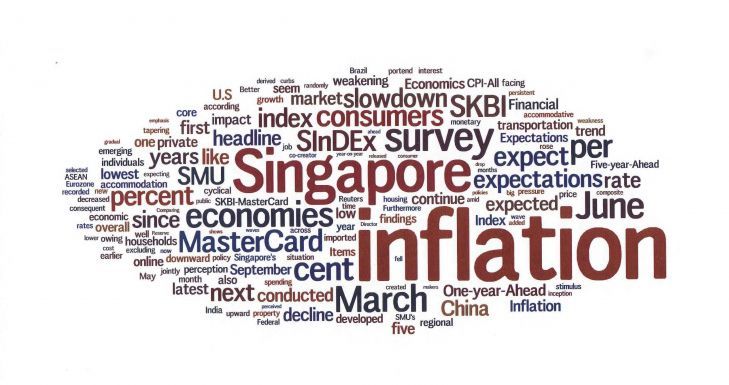
SINGAPORE, 21 October 2019 (Monday) - One-year-Ahead headline inflation expectations polled at 3.2% in September 2019. The reading compares to 2.9% polled in June 2019, and the previous five-year third quarter (2014-18) average of 3%.
The overall CPIEx Inflation Expectations, after adjusting for potential behavioral biases and re-combining across components, was at 3.3% in September 2019 compared to 2.9% in June 2019. The aggregate inflation expectations after correcting for behavioral biases increased to 3% in September 2019, compared to 2% in June 2019.
Excluding accommodation and private road transportation related costs, the One-year-Ahead Core CPIEx inflation expectations increased to 3.3% in September 2019 compared to 3.1% polled in June 2019. For a subgroup of the population who own their accommodation and use public transport, the One-year-Ahead CPIEx core inflation expectations inched up to 3.2% in September 2019 from 3.1% in June 2019. This subgroup’s expectations of core inflation closely resembles the Singapore Core Inflation Expectations, as unlike the general population they are not exposed to private road transportation or accommodation expenses.
The one-year-ahead composite index SInDEx1, that puts less weight on more volatile components like accommodation, private transport, food and energy, polled at 3.2% in September 2019 compared to 3.0% in June 2019.
DBS Chief Economist and Managing Director of Group Research, Dr. Taimur Baig commented, “Inflation remains low worldwide, with Singapore at the center of that narrative. While such trend is likely to persist, signs of a short-term bottom in inflation, both actual and expected, have emerged. Food and energy prices are low, but not falling any further. The survey readings are consistent with around 3% inflation expectations in Singapore over the medium term. ”
SMU Assistant Professor of Finance and Principal Investigator of the DBS-SKBI SInDEx Project, Aurobindo Ghosh observed, “Economic and policy uncertainty remain elevated worldwide, while growth expectations have dimmed. Accordingly, MAS has followed suit with major global economies to ease monetary policy in their October policy decision.
”Against this background, the uptick in inflation expectations is a tad surprising. Academic literature has highlighted a natural tendency of survey based inflation expectations measures to often be biased upwards despite adjustments. This has been widely observed in survey based methods in the University of Michigan Surveys of Consumers in the US, and more recently in New Zealand and Italy. It is therefore premature to read anything major from the latest findings ” Prof. Ghosh added.
The DBS-SKBI SInDEx survey was augmented in June 2018, based on a joint research study conducted by SMU researchers in collaboration with MAS and the Behavioral Insights Team, where respondents were polled about their perceptions of components of the Consumers Price Index (CPI) and adjusted for possible behavioral biases prevalent in online surveys.
Based on the recommendations of that study, the research team had, since March 2019 polled the One-year-Ahead inflation expectations of all of the major components of CPI-All Items inflation. Compared to June 2019, the September 2019 survey revealed inflation expectations across all categories have either stayed the same or inched up quarter on quarter, although without the same quarterly benchmark we were not able to conclude if the uptick is a peculiarity or a natural quarterly seasonality of these indices. The component inflation expectations indices that increased in September 2019 survey compared to June 2019 are transport, healthcare, education, recreation and communications.
For the longer horizon, the Five-year-Ahead CPIEx inflation expectations in the September 2019 survey elevated to 4.1% from 3.9% in June 2019. The current polled number is lower than the long-term (from 2012-19) average of 4.2%.
The Five-year-Ahead CPIEx core inflation expectations (excluding accommodation and private road transportation related costs) stayed unchanged at 3.9% in September 2019 from 3.8% in June 2019. Overall, the composite Five-year-Ahead SInDEx5 inched up to 4% in September 2019 from 3.8% in June 2019, slightly lower compared to its historical average of 4.0%.
Methodology
DBS-SKBI SInDEx survey yields CPIEx Inflation Expectations (estimating headline inflation expectations) and related indices are products of the online survey of around 500 randomly selected individuals representing a cross section of Singaporean households. The survey is led by Principal Investigator Dr. Aurobindo Ghosh, Assistant Professor of Finance (Education) at Lee Kong Chian School of Business, SMU. The online survey helps researchers understand the behavior and sentiments of decision makers in Singaporean households. DBS Group Research is a co-sponsor and research partner together with the Sim Kee Boon Institute for Financial Economics (SKBI) at SMU.
The quarterly DBS-SKBI SInDEx survey has also yielded two composite indices, SInDEx1 and SInDEx5. SInDEx1 and SInDEx5 measure the 1-year inflation expectations and the 5-year inflation expectations, respectively. The sampling was done using a quota sample over gender, age and residency status to ensure representativeness of the sample. Employees in some sectors like journalism and marketing were excluded as that might have an effect on their responses to questions on consumption behavior and expectations.